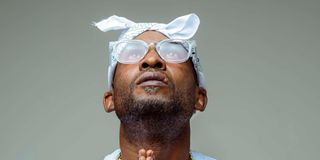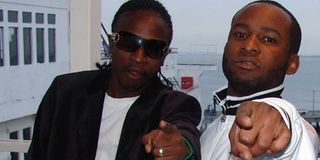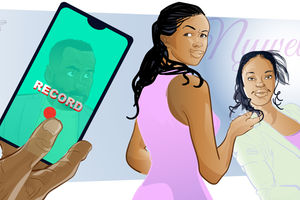
Kenya artiste Collins Majale, popularly known as Collo.
Collins Majale, popularly known as Collo, is a household name in the Kenyan music scene. He was part of the famous boyband Kleptomaniax that had a repertoire of hit songs under their belts, the most popular being “Tuendelee”.
He is known for his lyrical ability, notorious flow, and mean wordplay that had him at one point in time being pitted as one of the best rappers in Kenya.
After Kleptomaniax split up in 2009, he had a successful solo career in which he did notable tracks like “Party don’t Stop” with Camp Mulla, “You Guy” with P Unit and “Bazokizo” with Bruz Newton.
But he went silent for years. He says he took time off for introspection and to address personal issues. Collo comes back to the place he calls home. We sit on the balcony of Nairobi's Ngong’ Road Café Deli talking about his insights on music and his projects.
Where have you been?
I was self-reflecting, indulging in self-awareness. Looking for that right headspace to be able to do what I love to do, and be at a place where my money makes (more) money for me. It is important to take a break or you will break. Being famous isn’t easy, and in different seasons you have to retract.
What does this comeback mean to you?
In a nutshell, I believe that it is the right time to repackage the right message for a generation.
Did the focus on the gospel pay off in terms of money or sustainable livelihood?
To do gospel music and ask about sustainability is questionable. Some artistes do gospel and make money out of it, and then some don’t. I did it to share my spirituality with my fans. Before they [fans] knew that side of me, they enjoyed my music. And when I became spiritual and was mentored, I was sharing the same.
From my side, every single man on earth gets to a tipping point as far as their mental health is concerned, and at that point their level of mental health goes below average. It gets to a point where they have to figure out how to deal with that, and this is where salvation comes in.

Rappers Roba and Nyash of Klepto.
What kind of music should fans and new listeners expect from you?
Just good music and a more intimate relationship with them. I want to be more active on my social media and let people in on my personality. I am open to being more vulnerable because I am in my calling.
The music industry has evolved. How do you hope to stand out, be the Collo who was a sensation years ago?
I hope to be real. Being able to face myself will help me to stand out.
Music also comes with ageism. Do you have fears that now that you are coming back as a slightly older musician, it might be challenging to compete with younger musicians?
We are built as men to face challenges, naturally. The most successful businesses are built around finding solutions, and that is what I am here to do in the music space; to offer solutions. I wouldn’t say that I compete with anyone because the space is too big. There are about five generations co-existing right now; there is space for so many and also more.
How I stand out is how I face myself. I am only in competition with myself. Yes, some dope artistes are doing some dope things out here, and I acknowledge that, but I am more kingdom-minded, and the advancement of that kingdom is my focus. If there is demand for my kind of music, it is the reason I am here— to fulfill it.
Does music really pay? Were you living off music during your heyday? And now?
According to Professor Kimber Carballo from Indiana State University, music gets you to where you ought to be. It should pay, it could pay too (in future). During my heydays, there were fewer responsibilities than today and, since we invested in a risky era of music production, the motive and intention wasn’t to make money or earn a living. We did it for the passion! Because we were passionate about creating good music and sharing it. But there were opportunities. Yes, it pays now, but we desire better industries; we are in the process of creating better industries.
When did you receive your first million?
That was a long time ago, around 2007. I was about 18 years old.
Which song or performance?
It was more over a period than for a specific project.
Do you write your own songs? How did you come up with your new project?
Yes, I do write my own songs. I am targeting to write about 200 songs from which I will select the ones that will get to my album. It is the trickiest part about all this. An example is “Zee Anthem”, I had to sit through an eight-hour studio session, listening to 42 beats just to get to that particular one! It is a lot of work.
Has anything changed now as compared to back then?
We didn’t have a lot of live musical instruments involved in our productions back then, so it was cheaper.
Whereas now one might go viral on TikTok, they cannot necessarily be able to pull a show because they are unable to play music, unlike back then when that was essential. We have a lot of people who are popular but are not entertainers and would not know where to start when it comes to playing music and putting up a solid show.
What would you say your legacy is?
My legacy is Sauti ya Kijana. It’s an organisation I formed that prioritises giving boys a space to be heard.
It has been an interesting learning curve for me because it is an aspirational venture which has its own costs. We have had a couple of projects around it that have had to be shelved and wait for such a season to be able to utilise it because of the running costs. It is yet to take off.
Solo career or group career, which one are you more proud of?
I am proud of both, but I have embraced the solo career more; though it is tougher. Being in a group is easier because someone else is always going to get something done or figured out. I now appreciate the collaboration at that point and understand the value of what people bring to the table.
A solo career is more tough because now you have to run the business yourself. You are at the centre of everything; running around departments while also being on stage and putting up a smile, pretending that everything is okay while in the background everything is crazy. You choose your battles and this is mine.
Where do you stand on the divide between producer and artiste? Should producers make more?
I believe that everyone is bringing something to the table. In the model I work with, it is more of a 50-50 arrangement. They come with the beat and production and I bring the creative flow. We are both creatives, and that is fine. The arrangement could be different where you might want just to pay me for my services, and I am okay with it; as long as it doesn’t discredit me from my contribution and that is what is captured as a moral right.
Does gospel as a genre limit the scope of musical creativity? Are there things you can't do after you switch over?
I wouldn’t call it limited, but I would say that my creativity became more guided. It gets you to a space of writing because you don’t want to sing about just anything and everything. You must have a filter because some things are not necessary to sing about.
Is that a good thing or a bad thing?
You have to be set apart to reach a point where you realise that you have a gift which you cannot just misuse. You have a brand and you cannot just behave the way you feel because you are an artiste, it doesn’t make sense.
A spiritual encounter makes you even more mature, I was lucky to share about my spiritual growth with my fans two years after receiving it. Those two years before sharing were spent reading the room. Getting an encounter to do sacred music is a great opportunity to mature and be set apart.
Bazokizo showed us the possibilities with viral dance content. Do you feel it minimises music to produce it with TikTok in mind?
When I wrote “Bazokizo”, TikTok didn’t even exist; I wasn’t writing thinking of TikTtok, I was just creating. Interestingly, it is the best way to write. I was working with a dancer whom I rapped the hook to. That was just me in the element of creating music, not thinking about social media. Of course, we want it to reach out to people.
With the advent of TikTok does viral mean money?
Not necessarily. You might get the numbers but not necessarily the money. If you get the numbers and the money, well and good. You can have the numbers for the wrong reasons. I don’t think that trending translates to money unless you know how to work around it.









